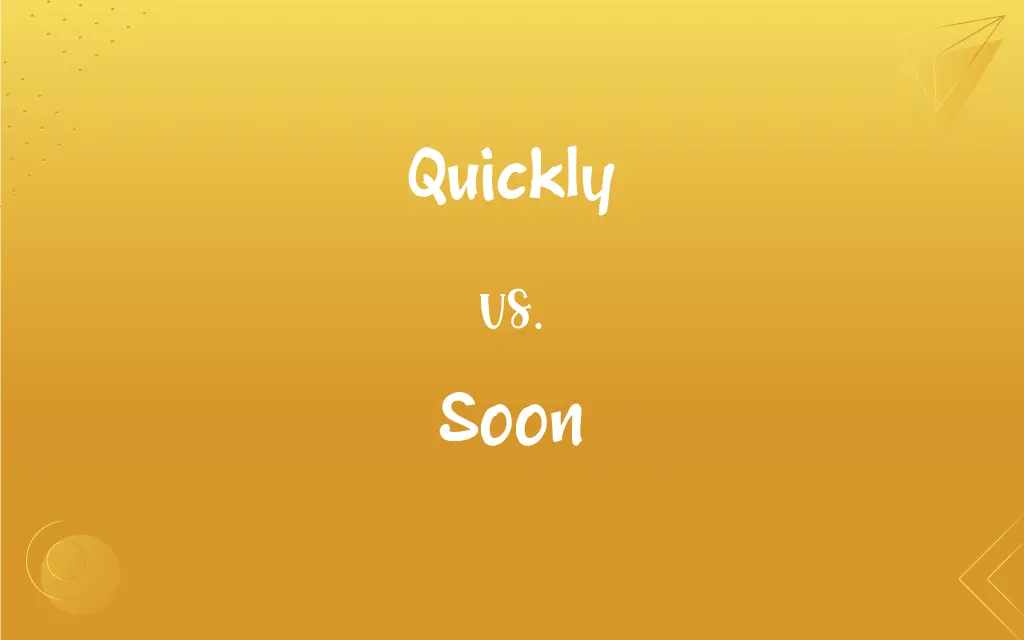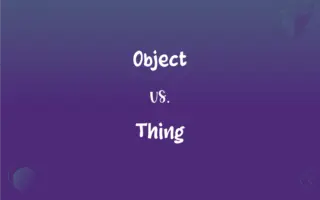Quickly vs. Soon: What's the Difference?
Edited by Aimie Carlson || By Harlon Moss || Updated on November 29, 2023
Quickly refers to doing something at a fast pace, while soon indicates something happening in a short time.

Key Differences
Quickly is an adverb describing the speed of an action, emphasizing rapidity and swiftness. Soon, on the other hand, is an adverb that relates to time, specifically indicating that an event will happen in the near future.
Quickly often implies immediate action or a fast response. Soon, in contrast, conveys anticipation of an event occurring in a short time, without specifying the speed of the action involved.
In use, quickly is typically associated with the manner in which an action is performed. Soon, however, is more about the timing of an event rather than the manner or speed of the action.
Quickly can be applied to various actions (running, speaking, thinking), while soon is usually connected with the expected time of an event or occurrence.
Quickly can modify an action verb to describe how fast something is done, whereas soon modifies the verb to indicate the nearness of the event's occurrence.
ADVERTISEMENT
Comparison Chart
Primary Meaning
Doing something at a fast pace.
Something happening in a short time.
Focus
Speed of action.
Timing of an event.
Use with Verbs
Modifies how fast an action is performed.
Modifies when an event is expected to occur.
Context
Implies immediate action or response.
Conveys anticipation of a future event.
Examples of Use
Running quickly, speaking quickly.
Arriving soon, happening soon.
ADVERTISEMENT
Quickly and Soon Definitions
Quickly
At a fast pace or speed.
She ran quickly to catch the bus.
Soon
Before long; shortly.
The sun will rise soon.
Quickly
With little or no delay.
He quickly answered the question.
Soon
Promptly or quickly in time.
We need to leave soon to catch the train.
Quickly
Without hesitation.
He quickly agreed to the proposal.
Soon
In a short time from now.
I will be home soon.
Quickly
In a brief period of time.
The meeting ended quickly.
Soon
In the near future.
The new store will open soon.
Quickly
With rapidity of action or movement.
She thought quickly on her feet.
Soon
Almost immediately.
She will be here soon after lunch.
Quickly
Moving or functioning rapidly and energetically; speedy
An animal that is quick enough to escape most predators.
Soon
In the near future; shortly
The bus should be here soon.
Quickly
Learning, thinking, or understanding with speed and dexterity; bright
A quick mind.
Soon
Just prior to something; shortly
The news broke soon before he resigned.
FAQs
How is soon different from quickly?
Soon refers to something happening in a short time, not necessarily rapidly.
What does quickly mean?
Quickly means doing something at a rapid pace or speed.
Can quickly and soon be used together?
Yes, they can be combined, as in "I will be there soon and quickly."
Does soon imply a specific time?
Soon implies a general sense of nearness in time, but not a specific moment.
Can soon be used for deadlines?
Yes, as in "The project is due soon."
Does quickly always mean immediate action?
Quickly often implies immediate or swift action, but not always instantaneously.
Is soon related to time?
Yes, soon is specifically related to the timing of an event.
Is quickly only about physical speed?
No, it can refer to speed in both physical and abstract senses.
Can quickly modify non-physical actions?
Yes, such as "quickly understanding" a concept.
Is quickly used in formal writing?
Yes, but its use depends on the context and tone of the writing.
Can quickly be used in emergencies?
Yes, to indicate the need for rapid action.
Is soon often used in promises?
Yes, as in "I'll get back to you soon."
Can quickly describe a person's thinking?
Yes, as in "She thinks quickly."
Is quickly a common adverb?
Yes, quickly is commonly used to describe fast actions.
Does quickly always imply haste?
Not always; it indicates speed but not necessarily rushed or careless action.
Can soon indicate eagerness?
Yes, as in "I'm looking forward to seeing you soon."
Can soon refer to the past?
In some contexts, as in "She left soon after."
Does quickly imply efficiency?
It can, but not necessarily; it mainly focuses on speed.
Is soon subjective?
Yes, its interpretation can vary based on personal perspective.
Does soon have a positive connotation?
It can, especially in contexts of anticipation or relief.
About Author
Written by
Harlon MossHarlon is a seasoned quality moderator and accomplished content writer for Difference Wiki. An alumnus of the prestigious University of California, he earned his degree in Computer Science. Leveraging his academic background, Harlon brings a meticulous and informed perspective to his work, ensuring content accuracy and excellence.
Edited by
Aimie CarlsonAimie Carlson, holding a master's degree in English literature, is a fervent English language enthusiast. She lends her writing talents to Difference Wiki, a prominent website that specializes in comparisons, offering readers insightful analyses that both captivate and inform.































































